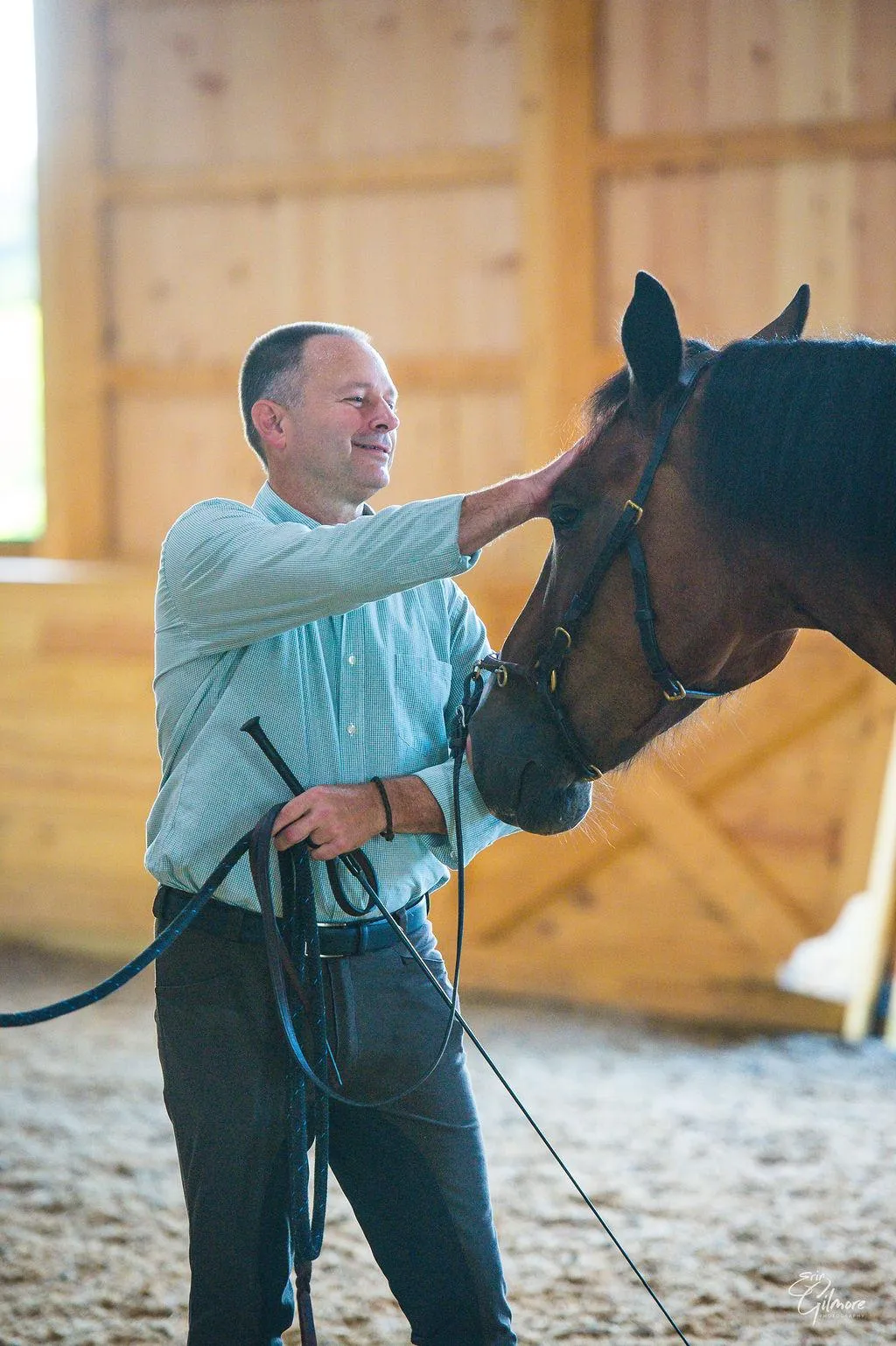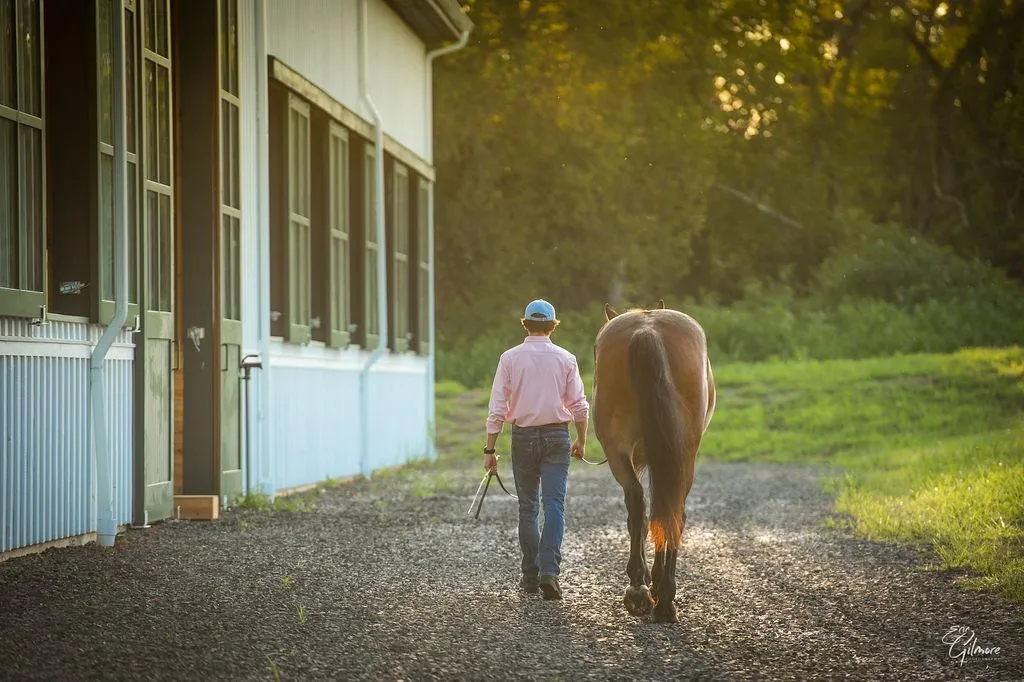
Transform Your Teaching:
Learn how to Confidently Help Riders Regulate Their Emotions & the strategies to reach Their Full Potential in the Arena
A ground-breaking 5-week course for riding instructors, trainers, coaches, and clinicians to gain the knowledge and tools to help students emotionally regulate the strongest and most common emotions that all riders experience and create positive learning environments that empower your students to manage their emotions when feeling frustrated, angry, upset, and fearful.
Emotions in the Arena:
The Art and Science of Teaching and Learning
As a horse professional you have resources at your fingertips that provide extensive information about horse care and riding techniques. Numerous teacher certification programs teach the rules, regulations, skills, and techniques guided by years of history and tradition.
Yet none of these resources provide horse professionals, like yourself, with the knowledge, resources and support to help your students deal productively with strong emotions like feeling frustration, anger, upset, and fear. Nor do they show you how to teach your students in order to best motivate, encourage, and empower them.
Emotions in the Arena: The Art and Science of Teaching and Learning fills that gap and provides instructors, trainers, coaches and clinicians with fundamental and practical knowledge every professional needs to know about themselves, their students, and the process of learning by teaching you essential concepts about teaching, learning and emotions that will transform your teaching and your student's success.
“In my 40 years of teaching, I’ve never had a course impact my students so profoundly. Understanding how emotions shape learning has changed the way I teach—and my riders are thriving!”
Carol Young
“I think this course is something every instructor should take. The combination of learning how and why things happen along with the practical examples of how we can deal with them, gives you a chance to think about things from a different perspective when you don’t have a client in front of you.”
Athena Haresign
What You Will Learn Inside Emotions in The Arena:
Section 1: The Nature and Influence of Emotions
Emotions are a powerful force in the learning process, shaping how students absorb information, respond to challenges, and perform in the arena.
In this section, you’ll explore how emotions—both positive and negative—impact attention, motivation, and skill development in riders. You’ll learn why fear, anxiety, and frustration can block learning, while curiosity and confidence enhance retention and progress. By understanding the psychological and physiological triggers behind emotional responses, you’ll understand how to help your students manage their emotions more effectively, creating a more supportive and productive learning environment.
Section 2: Foundations of Emotional Regulation
Emotional regulation isn’t just about willpower—it’s deeply rooted in the brain, nervous system, and social environment.
In this section, you’ll explore how emotions are processed neurologically, including the roles of affective neuroscience, the autonomic nervous system, and polyvagal theory in shaping emotional responses. You’ll understand why some students react with fear, anxiety, or frustration, and how their physiological state influences their ability to learn and perform. Additionally, you’ll examine the social foundations of emotional regulation, including how attachment, social learning, and relationships shape a rider’s ability to manage emotions. By understanding both the biological and social influences on emotional regulation, you’ll develop practical strategies to help your students stay calm, focused, and resilient in the arena.
Section 3: Creating and Nurturing Psychological Safety
For students to truly learn and grow, they need to feel safe, supported, and free to take risks without fear of failure or judgment.
In this section, you’ll discover how to create an atmosphere of psychological safety that encourages students to ask questions, express concerns, and push past their comfort zones. You’ll learn strategies to build trust, reduce anxiety, and foster resilience, allowing riders to stay engaged and confident even when faced with challenges. By cultivating a positive, respectful learning environment, you’ll help students develop the emotional security needed to process feedback, embrace learning, and ultimately perform at their best.
Section 4: Building Systemic Capacity in Our Students
Resilience isn’t just a personality trait—it’s a skill that can be developed and strengthened.
In this section, you’ll learn how to help students build the capacity to manage frustration, tolerate discomfort, and persist through challenges. By understanding the Window of Tolerance, you’ll be able to guide riders in expanding their ability to stay calm, focused, and engaged even in difficult situations. You’ll explore strategies such as grounding techniques, mindfulness, and constructive feedback to support emotional regulation and prevent emotional outbursts that can disrupt learning. By integrating these approaches into your teaching, you’ll empower students to handle setbacks with confidence, ultimately preparing them for a lifetime of growth in both riding and life.
Section 5: Practical Interventions for Addressing Elevated Emotions
Strong emotional reactions can derail a lesson, but with the right interventions, instructors can help students navigate fear, frustration, and anxiety in a way that keeps them engaged and progressing.
In this section you will gain practical tools to address elevated emotions effectively. You’ll discover how to implement cognitive strategies like thought replacement, reframing, and mindfulness to shift negative thought patterns and foster resilience. Learn how to leverage attention and focus through directing activities and mindfulness practices to improve student awareness and emotional regulation. You’ll master techniques to disrupt rigid, unhelpful emotional patterns early, ensuring safety and enhancing performance. Through somatic practices like breathwork and body scans, you'll increase body awareness and reduce stress. Finally, you’ll explore how to guide students through reflection and application, helping them integrate new skills and apply them in real-world situations for lasting emotional growth.
Section 6: Applications In Lessons
Emotional regulation strategies are only effective if they can be applied in real-world lesson scenarios.
In the final section, you will watch Dr. Paul work directly with riders experiencing fear, anxiety, and opposition, demonstrating how to apply the strategies learned throughout the course in real-world scenarios. This hands-on approach shows you how to manage and transform these emotional challenges in the arena, giving you valuable insights into how to handle these situations with confidence and effectiveness. By seeing these interventions in action, you’ll be equipped to navigate and support your own students through similar emotional hurdles, ensuring a safer, more empowering learning experience. This practical application is invaluable for reinforcing the techniques and building your ability to respond with clarity and skill.

Meet Your Instructor:
Paul T. Haefner, Ph.D.
Dr. Paul Haefner is a licensed clinical psychologist, sport psychology expert, and life-long equestrian with over 40 years of experience helping riders and instructors navigate emotions, learning differences, and performance challenges in the equestrian arena.
Throughout his career, Dr. Haefner has worked extensively with anxiety, fear, frustration, and emotional resilience, helping individuals develop the skills needed to perform under pressure. His expertise in affective neuroscience, emotional regulation, and learning psychology provides riding instructors with science-backed tools to support students who struggle with fear, anxiety, and emotional overwhelm in lessons and competition.
As the founder of Riding Far, LLC, Dr. Haefner has dedicated his work to bridging the gap between sport psychology and equestrian education, ensuring that instructors not only teach riding skills but also help students manage emotions that directly impact performance and learning. His research and hands-on experience highlight the critical connection between emotional regulation and the horse and rider relationship, showing that riders who can manage their emotions become more effective, confident, and connected with their horses.
In this course, Dr. Haefner will guide you through practical strategies to help students regulate emotions, de-escalate emotional reactions, and foster resilience, so you can create a more effective, supportive learning environment—ultimately leading to stronger riders, happier horses, and more rewarding lessons for everyone involved.
"Those of us who take some pride in having survived the ‘tough love’ learning era, probably are missing some key points when it comes to teaching with compassion. I’m just gonna say it.As teachers today, we can do better, especially once we know better. I highly recommend taking this course."
Lee McLean
Attending Riding Far’s clinic “The Art and Science of Teaching and Learning” has profoundly enhanced my ability to connect with riders to help them succeed.
Understanding the science behind anxiety and fear has been transformative. It helps me recognize these emotions as potential barriers to my riders' performance.
With the practical tools and tips provided by Paul and Justin, I can now tailor my teaching approach to support the riders more holistically, thus fostering their success."
Heather Henken

Earn Credibility as a Professional!
Upon successfully completing all Sections, Explorations, and Reflections, you’ll receive an official Certificate of Completion, recognizing your dedication to professional growth and comprehension of science-based teaching strategies. This certificate not only validates your commitment to helping students regulate emotions and improve performance in the arena, but it can also be applied toward Continuing Education hours for various instructor accreditations. Stand out as a professional who prioritizes proven, psychology-backed techniques, giving you a competitive edge in the industry while enhancing your students' success.
Exclusive Bonus!
Upon Enrolling in the Course you will also receive:
Bonus ONE
Comprehensive Course Workbook
An in-depth printable workbook designed to serve as your quick reference guide for each section of the course. This workbook consolidates key concepts, strategies, take-aways, and exercises, helping you apply what you have learned in real time with your students.
Bonus TWO
Exclusive LIVE Weekly Training Sessions with Dr. Paul Haefner
Get direct access to Dr. Paul Haefner for six group coaching and Q&A sessions, and personalized support. These interactive sessions give you the opportunity to ask your own questions, gain deeper insights, and receive expert guidance on applying course concepts to your unique teaching challenges. Whether you need clarity on emotional regulation strategies or help with real-life student scenarios, these live sessions ensure you get individualized support to maximize your success.
Bonus THREE
Huge Collection of Additional Learning Resources
Take your understanding even further with Dr. Haefner's curated collection of books, videos, research articles, courses, websites, and lectures that provide a deeper dive into each lesson topic. This comprehensive resource guide allows you to expand your knowledge, explore advanced concepts, and continue growing as an instructor long after the course ends. Whether you're looking for scientific research, expert insights, or practical applications, these additional materials will support your ongoing education and desire to empower your students for success.
Enroll Today and Get Access to:
6 In-Depth Modules
containing ~20-minute video lessons
Guided Explorations and Reflections
to help you apply what you learn in each Section
Real-World Case Studies & Examples
to help you understand how to apply what you're learning in the arena
Exclusive Bonus Material: Printable Course Workbook
to consolidate key concepts, strategies, and exercises
Exclusive Bonus Material: LIVE Weekly Training Sessions with Dr. Paul Haefner
6 weeks of live group coaching, Q&A sessions, and personalized support
Exclusive Bonus Material: Dr. Paul Haefner's Curated Collection of Additional Learning Resources
Books, videos, research articles, courses, websites, and lectures that provide a deeper dive into each lesson topic
Choose the Payment Option That Fits You Best:
One-Time Payment
$495
(Save More!)
Easy Payment Plan: 2 Payments
$275
(Billed every 3 weeks)
Enrollment is Closed:
Join the Waitlist to be notified when this course is available again!
You'll get access to:
6 In-Depth Modules
containing ~20-minute video lessons
Guided Explorations and Reflections
to help you apply what you learn in each Section
Real-World Case Studies & Examples
to help you understand how to apply what you're learning in the arena
Exclusive Bonus Material: Printable Course Workbook
to consolidate key concepts, strategies, and exercises
Exclusive Bonus Material: LIVE Weekly Training Sessions with Dr. Paul Haefner
6 weeks of live group coaching, Q&A sessions, and personalized support
Exclusive Bonus Material: Dr. Paul Haefner's Curated Collection of Additional Learning Resources
Books, videos, research articles, courses, websites, and lectures that provide a deeper dive into each lesson topic

7 Day Money Back Guarantee
If within the within the first 7 days of the course, you find that this course doesn't meet your expectations or needs, please don't hesitate to contact us. We will promptly refund your money, no questions asked. Your satisfaction is paramount to us, and we are here to support you every step of the way.
Frequently Asked Questions
Who is this course for?
This course is designed for riding instructors, trainers, coaches, and clinicians who want to help their students manage emotions and improve their performance in the saddle.
How long does it take to complete the course?
The course is taught in a live format over 5 weeks. Each section contains multiple easy to follow lessons and actionable exercises along with additional resources for you to go deeper into your studies. Students will have access to the course material for 7 weeks total to complete the sections.
When will the Live Session be held?
Weekly Live Sessions will be held on Thursday evenings at 7pm EST. If you are unable to attend the Live Sessions, you may submit your questions ahead of time and review the replays of the Live Sessions inside the course following the session.
©2025 Riding Far LLC - All Right Reserved | Terms and Condition ● Privacy Policy
Photos by Erin Gilmore Photography